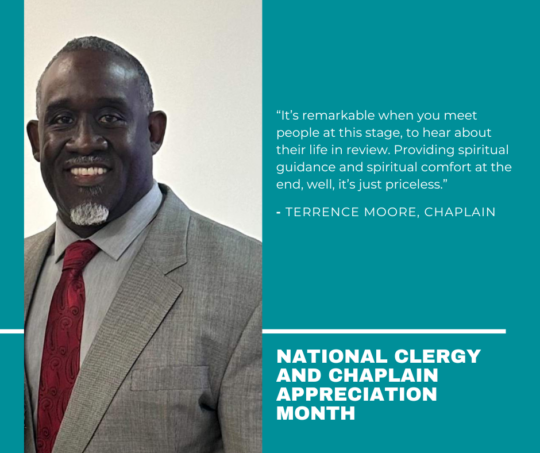
Terrence Moore grew up in a deeply Christian home, but he hadn’t planned to be a chaplain. As a teen and young man, he liked and excelled in football. His skills even earned him a scholarship to the University of New Mexico. But eventually, Terrence felt the tug of the gospel and a deep desire to minister to others.
“I came into a greater understanding of my purpose and call in life. Under the development and the teaching of my pastor, I began to grow and grow and grow,” says Terrence.
At first, Terrence was drawn to prison ministry. He served as a chaplain in the prison system for nine years before transitioning to working with at-risk youths. Then he spent time in the memory care unit of an assisted living home.
His life was rich with experiences, but something was missing and he couldn’t put his finger on it. “I didn’t feel fulfilled,” said Terrence. “That’s when I began to ask God how the next chapter of my life should look.”
Terrence found his answer when he joined Traditions Health in Atlanta, Georgia, as a chaplain ministering to patients and their families and caregivers.
The power of spiritual care in end-of-life support
Spiritual care is a vital part of palliative care and hospice. Patients and their families often experience a greater sense of peace and quality of life when they receive emotional and experiential support.
The National Cancer Institute’s Physician Data Query (PDQ) reviews the role of spirituality and religion in caring for patients with advanced cancer. It serves as a helpful guide to physicians, outlining some of the benefits of spiritual care, which include giving patients and their loved ones:
- Greater sense of hope
- Freedom from regret
- Inner peace
- Renewed optimism
Recent studies underscore the significance of spiritual care. A cross-sectional, international study published in BMC Palliative Care explored the impact of spiritual well-being on physical and psychological symptoms in people with advanced cancer. The study found that peace and faith provided through spiritual care helped manage depression, anxiety, and pain in these patients.
Learning how to minister to patients in hospice care
Terrence entered his new position as a spiritual professional with Traditions Health unsure of how he’d be able to provide comfort to patients and their families. Although he had ministered to people at or near the end of their lives in the memory care unit, hospice care was different.
“I knew it was going to be challenging to minister to the individuals on hospice, and the families as well. But I just knew that this was where God wanted me to be. That provided some comfort and peace about being able to perform the job,” says Terrence.
He received in-depth training on the job to prepare him for his new role, including shadowing and being part of conversations with patients and families. These experiences set the foundation that allowed him to step more comfortably into his role.
It wasn’t always easy. Terrence says there were times when he felt at a loss for words or was afraid he would say the wrong thing. The work requires navigating the intensity and various stages of grief and sometimes helping people face their biggest fears. But each conversation Terrence had with a patient built on the next. He learned and listened.
“I think learning how to be an active listener was critical for me,” he says. “I’ve learned that sometimes it’s not necessary to say anything at all. Often, patients and family members just need a hug or for you to be that comforting spiritual presence.”
Giving and getting back
Terrence acknowledges that ministering to people struggling with the unknowns of illness and end of life isn’t a calling for everyone. But in this work, Terrence has found a deep sense of fulfillment and peace.
“It’s remarkable when you meet people at this stage, to hear about their life in review. Providing spiritual guidance and spiritual comfort at the end, well, it’s just priceless.”
Here to offer spiritual and emotional support
Our chaplains and spiritual professionals are here to support you. Regardless of culture or religion, our goals are to provide our patients and their families peace, comfort and love to promote their spiritual and emotional well-being.
If you think you or a loved one would benefit from hospice and our spiritual and emotional support services, please contact us today.